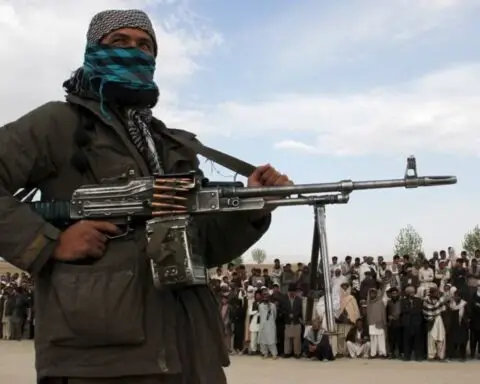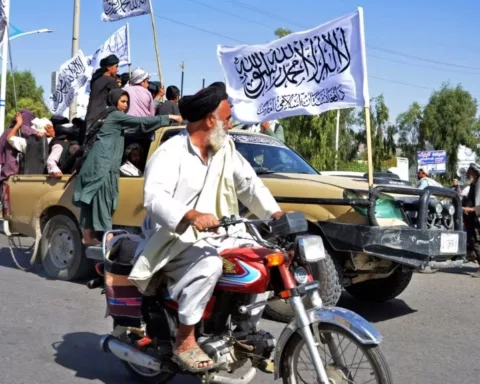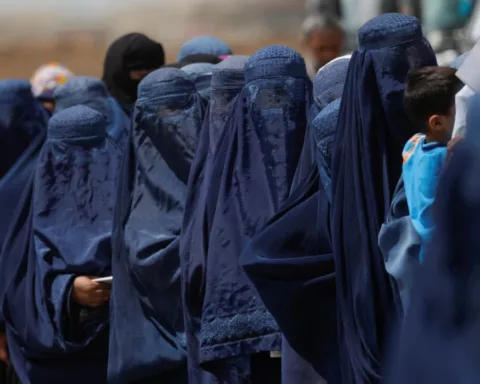Streets across Kabul were quiet early on August 17, while the situation at the airport had improved, allowing for the flights that were interrupted a day earlier when thousands of Afghans swarmed the airfield in a desperate attempt to flee the country after the Taliban captured the capital and the government collapsed with President Ashraf Ghani fleeing abroad.
At least seven people were reportedly killed in the mayhem, though it is unclear if they were shot or crushed in a stampede. The chaotic scenes prompted the U.S. military and international forces to temporarily suspend flights to clear the airfield.
It was a much quieter scene on August 17, with a Western security official telling Reuters that “many people who were here yesterday have gone home.”
However, the news agency cited witnesses as saying that occasional gun shots can still be heard from the direction of the airport — currently the only exit point open to Western forces from Afghanistan with most countries closing their embassies.
European Union foreign ministers and NATO ambassadors are set to hold emergency meetings in Brussels on August 17 to discuss evacuation plans and the situation in general in Afghanistan.
Kabul was the last major city in Afghanistan to hold out against a Taliban offensive that accelerated in the space of days as they rapidly gained control of territories across the country.
The Taliban militants have taken control of the city’s security and could be seen in streets and squares, which remained largely empty with little traffic. Big markets and shopping malls are closed but people were getting supplies from some grocery stores.
Amid widespread fears that those that worked for government or Western-backed organizations would face persecution under Taliban rule, the AFP news agency quoted a statement from the group as saying it had issued a general amnesty for all government officials and urged them to return to work with “full confidence.”
Speaking on Afghan state television, which the militants now control, a member of the Taliban administration, also urged women to join the government, according to The Associated Press.
“The Islamic Emirate doesn’t want women to be victims,” Enamullah Samangani said, using the militants’ term for Afghanistan.
“The structure of government is not fully clear, but based on experience, there should be a fully Islamic leadership and all sides should join.”
A senior Taliban representative said militants were ordered not to enter any vacated embassy facilities.
The UN Security Council on August 16 called for talks to create a new government in Afghanistan after Secretary-General Antonio Guterres warned of “chilling” curbs on human rights and violations against women and girls.
British Foreign Secretary Dominic Raab told the BBC that the international community had to use “every lever…to secure a moderating influence” on Afghanistan.
The leader of Hizb-e Islami political and paramilitary group Gulbudin Hekmatyar said he would travel to Qatar on August 17 to meet with Taliban representatives, accompanied by former President Hamid Karzai and ex-foreign minister and the head of the Afghan National Reconciliation Council Abdullah Abdullah, Al Jazeera TV reported.
Meanwhile, Western governments scrambled to evacuate their nationals, Afghans who worked alongside them, and others considered vulnerable under Taliban rule.
Major General Hank Taylor, a logistics specialist on the Pentagon’s Joint Chiefs of Staff, said the United States was “in charge of air traffic control” at Hamid Karzai International Airport for military and commercial flights.
“Our focus right now is to maintain security at HKIA, to continue to expedite flight operations while safeguarding Americans and Afghan civilians,” he said.
India on August 17 became the latest country to evacuate its embassy in Kabul, reportedly leaving only three embassies operating in the Afghan capital — Russia, China, and Pakistan — as the top U.S. diplomat in Kabul dismissed reports that he had left the country.
“Contrary to false reports, @USEmbassyKabul staff & I remain in #Kabul working hard to help 1000s of U.S. citizens and vulnerable Afghans & continuing engagement here,” the U.S. charge d’affaires in Kabul, Ross Wilson, said in a tweet.
Russia has said it would only partially evacuate its embassy staff.
The country’s ambassador, Dmitry Zhirnov, is set to hold talks with Taliban representatives on August 17 to discuss the security of Russian citizens and embassy personnel.
In Washington, U.S. President Joe Biden said “thousands” of U.S. citizens and Afghans who had worked with American forces will be evacuated over the coming days, and threatened a “devastating” military response if the Taliban launch attacks on U.S. interests.
As he faces criticism over the Taliban’s seizure of Afghanistan’s biggest cities in days, in many cases after government forces surrendered despite years of training and equipping by the United States and others, Biden said that he stands “squarely” behind the U.S. exit from the war-torn country.
He said that despite the “messy” pullout, “there was never a good time to withdraw U.S. forces.”
Meanwhile, U.S. Secretary of State Antony Blinken spoke separately with officials in Pakistan, Russia, Britain, the European Union, Turkey, and NATO about Afghanistan, including “the developing situation and our efforts to bring our citizens to safety and assist vulnerable Afghans,” according to the State Department.
Pakistan’s Foreign Ministry quoted Foreign Minister Shah Mahmood Qureshi as telling Blinken that an “inclusive political settlement was the best way forward” for resolving the current political impasse.
Qureshi said Pakistan would remain closely engaged with the United States and other international partners in promoting efforts in support of a peaceful and stable Afghanistan.
According to Russia’s Foreign Ministry, Lavrov and Blinken agreed “to continue consultations” that would involve China, Pakistan, other “interested nations” and the UN to try to press for an intra-Afghan dialogue.






